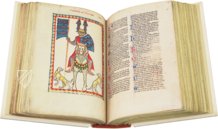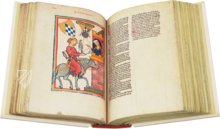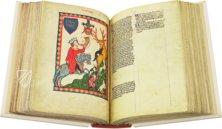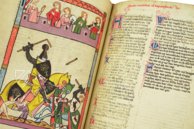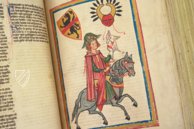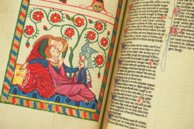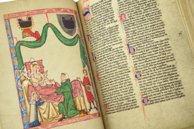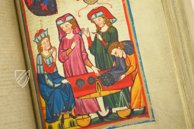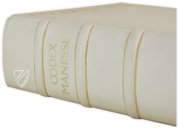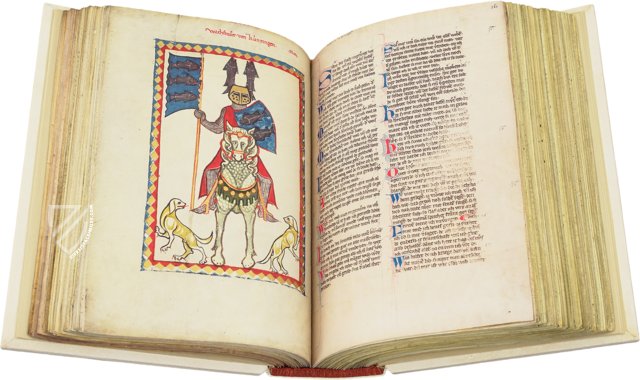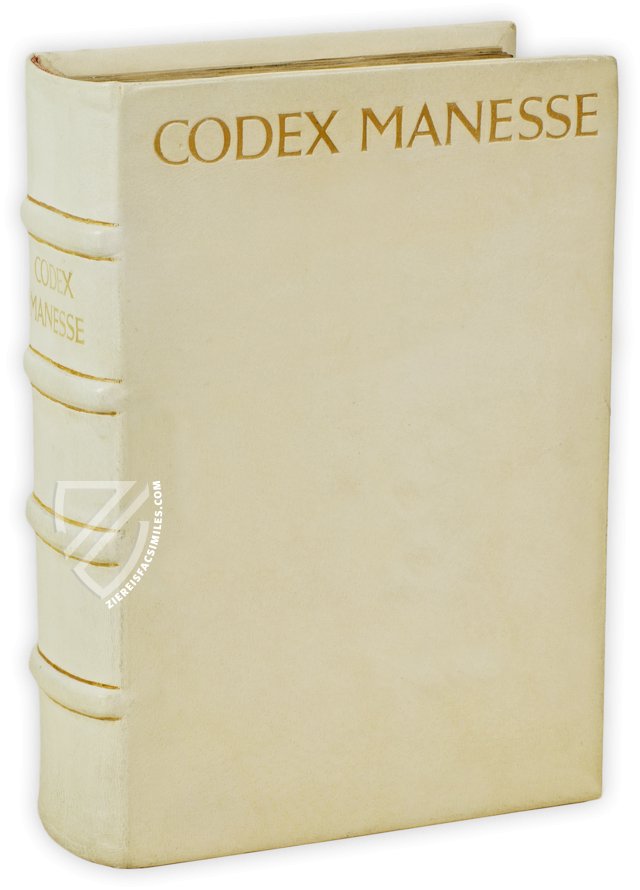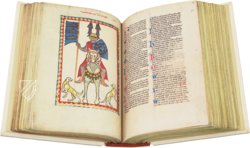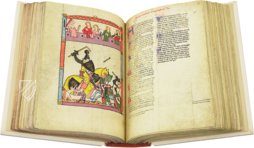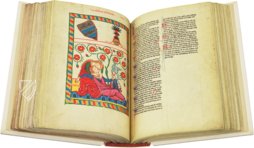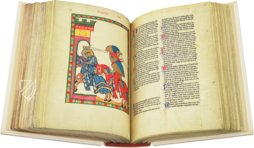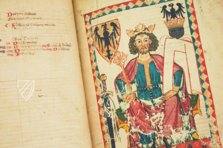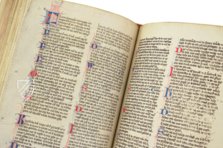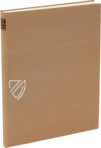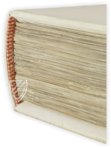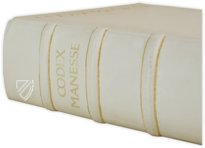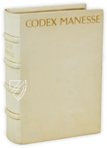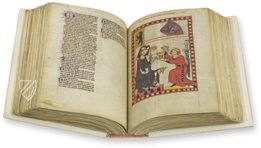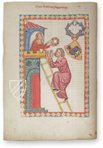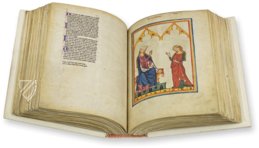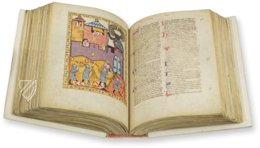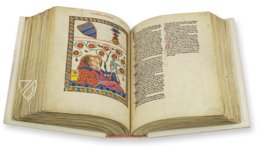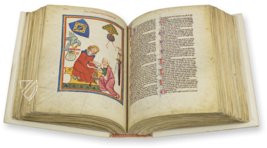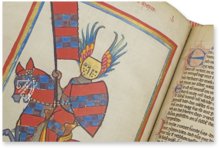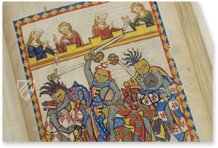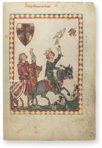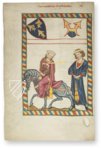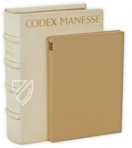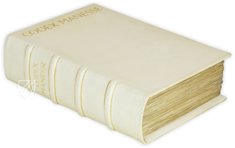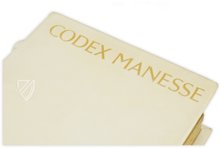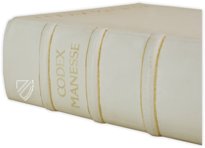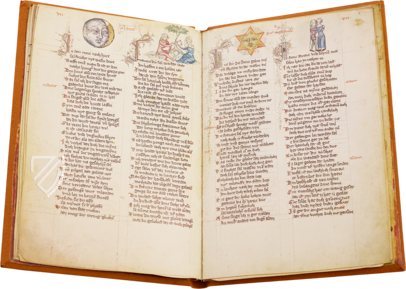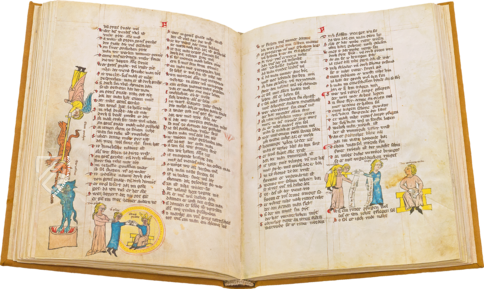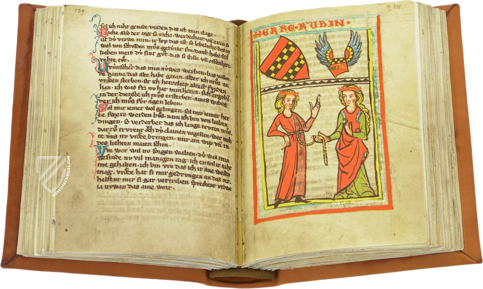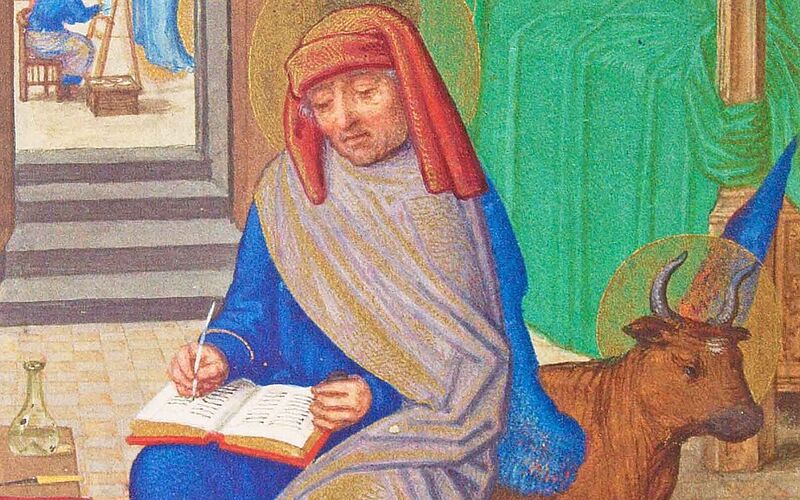Codex Manesse
(7,000€ - 10,000€)
One of the most significant German-language manuscripts of the Middle Ages is now kept in the Heidelberg University Library: the so-called Codex Manesse, also known as the Great Heidelberg Song Manuscript. The codex was probably commissioned by the eponymous Zurich patrician family Manesse, whereby the poetic foundation of the anthology was regularly expanded between 1300 and 1340. With 6000 strophes of Middle High German poetry by 140 poets, the codex contains the “most comprehensive collection of Middle High German poetry of songs and sayings”. Arranged according to the rank of their author, the works are also wonderfully illuminated with 137 gorgeous full-page miniatures, which are entirely devoted to the theme of courtly love. This makes the Codex Manesse not only a treasure of German poetry and the most important source for Gothic minnesong, but also of late medieval book illumination. This is also reflected in the turbulent and in parts almost unbelievable provenance history of this unique testimony to medieval culture.
Codex Manesse
One of the most important manuscripts of the entire Middle Ages is housed today in the Heidelberg University Library: the so-called Codex Manesse, also known as the Great Heidelberg Book of Songs. An unbelievable ownership history entwines itself around the manuscript, which arose in Zurich between 1300 and 1340. The codex contains 6,000 strophes of Middle High German lyrics from 140 poets along with the “most comprehensive collection of High Middle German song and spoken poetry”. The poems, songs, and sayings revolve around the primary theme of courtly love. These attestations of medieval lyric are wonderfully illustrated with 137 lovely full-page miniatures. As a result, the Codex Manesse is not only a true treasure of German literature and medieval history, but also and in particular of Gothic book painting!
A Unique Certificate of Middle High German Lyric
The patrician Manesse family from Zurich is considered to be the commissioner and eponym of the famous manuscript. At the beginning of the 14th century, the Zurich patrician Rüdiger Manesse and his son Johann compiled an enormous collection of Middle High German lyric, which served as the foundation of the codex. This was continuously enlarged and supplemented up until 1340. Altogether, the Codex Manesse contains 6,000 strophes of High Middle German lyric, song, and sayings from 140 authors, among them such famous names as Walther von der Vogelweide, Wolfram von Eschenbach, Hartmann von Aue, Gottfried von Straßburg, and Ulrich von Liechtenstein. The lyric from the time of 1160/70 up to ca. 1330 has been singularly recorded here to some extent, which makes the *Great Heidelberg Book of Songs***one of the most important sources for the Minnesang**. Curiously, the songs and poems are organized according to the rank of their composer. The manuscript begins with the lyric of Emperor Henry IV as the most aristocratic poet. Thereafter follow kings, dukes, and other nobles down to the bourgeois and professional poets.
The Struggle for the Treasure
Today the Codex Manesse is housed in Heidelberg. Nevertheless, the manuscript is intertwined in an exceptionally exciting, varied provenance. The manuscript first remerged at the end of the 16th century, as Prince-Elector Friedrich IV of the Palatine (1583–1610) brought the codex to Heidelberg. There it was a part of the famous Bibliotheca Palantina. Already appreciated then as a unique anomaly, it was taken into safety and stored before all the rest of the collection was brought to Rome by plundering Catholic armies during the 30 Years War. Thereafter, the Codex Manesse first showed up again in the 17th century in France, where it was a part of the Royal Library. The manuscript was soon recognized as an important German cultural asset and its return to Germany was contested. This first came to pass in the year 1887 when it was given over to Germany in a spectacular exchange deal – for 120,000 Francs and 166 valuable manuscripts, some of them Carolingian – following the approval of Reich Chancellor Otto von Bismarck and found its place in the University Library of Heidelberg. Thereby the historical will of Kaiser Friedrich III was followed, who entrusted the Codex Manesse to the University Library of Heidelberg as the successor of the famous Bibliotheca Palantina.
Significant Miniatures as Rich Pictorial Adornment
Alongside being the unique source for High Middle German lyric, the Great Heidelberg Book of Songs is famous above all for its splendid and qualitatively artistic furnishings. These present the illumination of the Upper Rhine during the Staufer period in perfection. 137 full-page miniatures from four different masters adorn the altogether 852 pages of the manuscript. Art history differentiates between the two so-called foundation-masters, who are responsible for 110 of the splendid miniatures, and their three successors. In gorgeous multicolored decorative frames, the miniatures present scenes from the courtly world of the Middle Ages. They orbit, like the poems, around the primary theme of courtly love, the erotic love between man and woman. Thus, for example, one of the depictions shows a noble young lady on horse with a golden arrow in her hand. With this golden arrow she aims at a young man, probably a poet – an ancient symbol of love. Other scenes present kings while hawking, battling knights at a tournament in magnificent suits of armor who are watched and judged by noble ladies, or the coronation of a poet by a woman, who sets a wreath upon his head. In this way the codex offers a profound glimpse into the world of the High Middle Ages. Simultaneously, the artist presents himself as an outstanding master of medieval illumination through his exceptional pictorial compositions. This connection between Middle High German Lyric and gothic book illumination, all of the highest quality, makes the Codex Manesseone of the most valuable manuscripts in the University Library of Heidelberg and simultaneously one of the most significant codices of the entire Middle Ages!.
Codicology
- Alternative Titles
- Manesse Codex
The Great Heidelberg Song Manuscript
Manesse Song Manuscript
Große Heidelberger Liederhandschrift
Codex Germanicus Palatinus 848 - Size / Format
- 852 pages / 35.5 × 25.0 cm
- Origin
- Switzerland
- Date
- After 1310 until ca. 1340
- Epochs
- Style
- Genre
- Language
- Script
- Gothic Textura
- Illustrations
- 137 full-page miniatures in colorful frames, an unfinished pen-and-ink drawing, and countless fleuronnée initials
- Content
- Collection of 6000 strophes of Middle High German lyrics (songs and gnomic poetry) dating from 1160/70 to around 1330, the most important source for "Minnesang"
- Patron
- The patron is unknown. He was probably associated with Zurich's patrician Manesse family, after whom the manuscript is named, or the family of the Count of Toggenburg from Thurgau
- Artist / School
- 140 different authors, including Walther von der Vogelweide, Wolfram von Eschenbach, Hartmann von Aue, Gottfried von Straßburg, Emperor Henry VI and Conradin, the last of the Hohenstaufen dynasty
Four different illuminators, of whom the one known as the Foundation Master was responsible for 110 miniatures - Previous Owners
- Manesse family
Johann Philip of Hohensax
Count palatine Frederick Ill, Frederik IV, Frederick V
Johann Count of Tilly
King Louis XIV (reigned 1643–1715)
Jacques Dupuy
Bibliothèque royale de Paris
Karl Trubner
Codex Manesse
Konrad von Altstetten
Lounging in a garden surrounded by flowers, two young lovers embrace one another in a surprisingly intimate scene. The minstrel is believed to be Konrad von Altstetten, who was documented between 1320 and 1327. Based in the Upper Rhine Valley, the von Altstetten family has been attested to since 1166 and was in the service of the Abbot of St. Gallen. Konrad is shown casually feeding his falcon with a gloved hand and rubbing cheeks with his lady who has long, flowing, curly blonde hair.

Codex Manesse
Author Portrait of King Conrad the Younger
Usually known by the diminutive Conradin, King Conrad the Younger is the second author featured in this collection of poetry, outranked only by the Emperor Charles IV. Although he only lived to the age of 16, he wrote two songs worthy of being included in this manuscript. Conrad is depicted hunting with his friend and ally Margrave Frederick I of Baden.
The crowned Conrad has just released his falcon as the two nobleman engage in a favorite pastime of the aristocracy. His hunting dogs watch with anticipation, as does Frederick, who is dressed in a red robe. Gold leaf has been used for Conrad’s crown, the collar of his green tunic, saddle, and coat of arms, as well as the diamond-patterned red and blue frame.
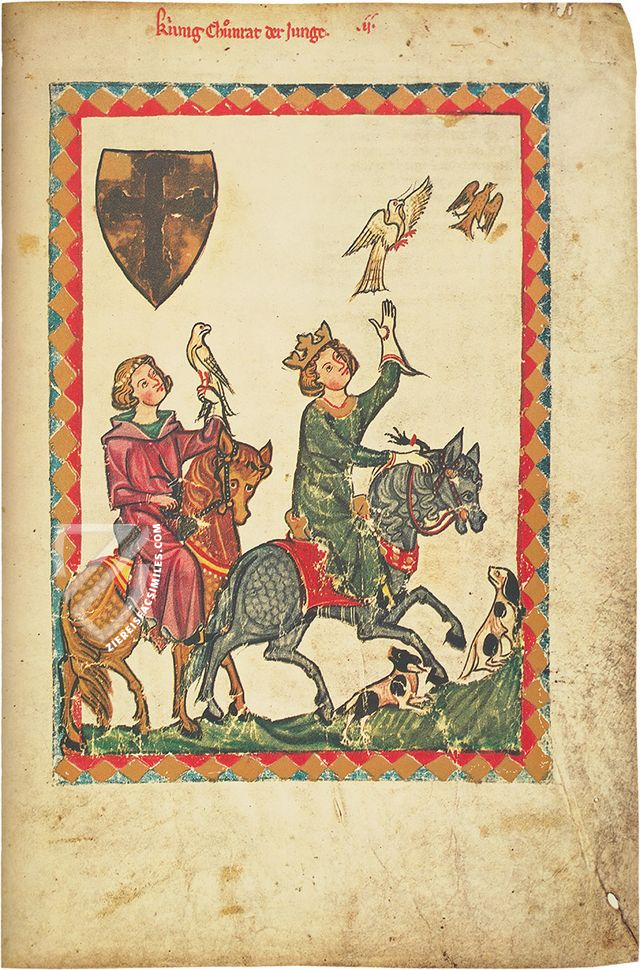
#1 Codex Manesse: die Grosse Heidelberger Liederhandschrift
Language: German
(7,000€ - 10,000€)
#2 Codex Manesse
Language: German
(7,000€ - 10,000€)
#3 Codex Manesse. Vier Miniaturen
Language: German
(under 1,000€)
- Treatises / Secular Books
- Apocalypses / Beatus
- Astronomy / Astrology
- Bestiaries
- Bibles / Gospels
- Chronicles / History / Law
- Geography / Maps
- Saints' Lives
- Islam / Oriental
- Judaism / Hebrew
- Single Leaf Collections
- Leonardo da Vinci
- Literature / Poetry
- Liturgical Manuscripts
- Medicine / Botany / Alchemy
- Music
- Mythology / Prophecies
- Psalters
- Other Religious Books
- Games / Hunting
- Private Devotion Books
- Other Genres
- Afghanistan
- Armenia
- Austria
- Belgium
- Colombia
- Croatia
- Cyprus
- Czech Republic
- Denmark
- Egypt
- Ethiopia
- France
- Germany
- Greece
- Hungary
- India
- Iran
- Iraq
- Israel
- Italy
- Japan
- Lebanon
- Luxembourg
- Mexico
- Morocco
- Netherlands
- Palestine
- Peru
- Poland
- Portugal
- Russia
- Serbia
- Spain
- Sri Lanka
- Sweden
- Switzerland
- Syria
- Turkey
- Ukraine
- United Kingdom
- United States
- Uzbekistan
- Aboca Museum
- Ajuntament de Valencia
- Akademie Verlag
- Akademische Druck- u. Verlagsanstalt (ADEVA)
- Aldo Ausilio Editore - Bottega d’Erasmo
- Alecto Historical Editions
- Alkuin Verlag
- Almqvist & Wiksell
- Amilcare Pizzi
- Andreas & Andreas Verlagsbuchhandlung
- Archa 90
- Archiv Verlag
- Archivi Edizioni
- Arnold Verlag
- ARS
- Ars Magna
- ArtCodex
- AyN Ediciones
- Azimuth Editions
- Badenia Verlag
- Bärenreiter-Verlag
- Belser Verlag
- Belser Verlag / WK Wertkontor
- Benziger Verlag
- Bernardinum Wydawnictwo
- BiblioGemma
- Biblioteca Apostolica Vaticana (Vaticanstadt, Vaticanstadt)
- Bibliotheca Palatina Faksimile Verlag
- Bibliotheca Rara
- Boydell & Brewer
- Bramante Edizioni
- Bredius Genootschap
- Brepols Publishers
- British Library
- C. Weckesser
- Caixa Catalunya
- Canesi
- CAPSA, Ars Scriptoria
- Caratzas Brothers, Publishers
- Carus Verlag
- Casamassima Libri
- Chavane Verlag
- Christian Brandstätter Verlag
- Circulo Cientifico
- Club Bibliófilo Versol
- Club du Livre
- CM Editores
- Collegium Graphicum
- Collezione Apocrifa Da Vinci
- Comissão Nacional para as Comemorações dos Descobrimentos Portugueses
- Coron Verlag
- Corvina
- CTHS
- D. S. Brewer
- Damon
- De Agostini/UTET
- De Nederlandsche Boekhandel
- De Schutter
- Deuschle & Stemmle
- Deutscher Verlag für Kunstwissenschaft
- DIAMM
- Droz
- E. Schreiber Graphische Kunstanstalten
- Ediciones Boreal
- Ediciones Grial
- Ediclube
- Edições Inapa
- Edilan
- Editalia
- Edition Deuschle
- Edition Georg Popp
- Edition Leipzig
- Edition Libri Illustri
- Editiones Reales Sitios S. L.
- Éditions de l'Oiseau Lyre
- Editions Medicina Rara
- Editorial Casariego
- Editorial Mintzoa
- Editrice Antenore
- Editrice Velar
- Edizioni Edison
- Egeria, S.L.
- Eikon Editores
- Electa
- Emery Walker Limited
- Enciclopèdia Catalana
- Eos-Verlag
- Ephesus Publishing
- Ernst Battenberg
- Eugrammia Press
- Extraordinary Editions
- Fackelverlag
- Facsimila Art & Edition
- Facsimile Editions Ltd.
- Facsimilia Art & Edition Ebert KG
- Faksimile Verlag
- Feuermann Verlag
- Folger Shakespeare Library
- Franco Cosimo Panini Editore
- Friedrich Wittig Verlag
- Fundación Hullera Vasco-Leonesa
- G. Braziller
- Gabriele Mazzotta Editore
- Gebr. Mann Verlag
- Gesellschaft für graphische Industrie
- Getty Research Institute
- Giovanni Domenico de Rossi
- Giunti Editore
- Graffiti
- Grafica European Center of Fine Arts
- Guido Pressler
- Guillermo Blazquez
- Gustav Kiepenheuer
- H. N. Abrams
- Harrassowitz
- Helikon
- Hendrickson Publishers
- Henning Oppermann
- Herder Verlag
- Hes & De Graaf Publishers
- Hoepli
- Holbein-Verlag
- Hortus Deliciarum
- Houghton Library
- Hugo Schmidt Verlag
- Idion Verlag
- Il Bulino, edizioni d'arte
- ILte
- Imago
- Insel Verlag
- Instituto Nacional de Antropología e Historia
- Istituto dell'Enciclopedia Italiana - Treccani
- Istituto Ellenico di Studi Bizantini e Postbizantini
- Istituto Geografico De Agostini
- Istituto Poligrafico e Zecca dello Stato
- Italarte Art Establishments
- J. Thorbecke
- Jan Thorbecke Verlag
- Johnson Reprint Corporation
- Josef Stocker
- Josef Stocker-Schmid
- Jugoslavija
- Karl W. Hiersemann
- Kasper Straube
- Kaydeda Ediciones
- Kindler Verlag / Coron Verlag
- Kodansha International Ltd.
- Konrad Kölbl Verlag
- Kurt Wolff Verlag
- La Liberia dello Stato
- La Linea Editrice
- La Meta Editore
- Lambert Schneider
- Landeskreditbank Baden-Württemberg
- Leo S. Olschki
- Les Incunables
- Library of Congress
- Libreria Musicale Italiana
- Lichtdruck
- Lito Immagine Editore
- Lumen Artis
- Lund Humphries
- M. Moleiro Editor
- Maison des Sciences de l'homme et de la société de Poitiers
- Manuscriptum
- Martinus Nijhoff
- Maruzen-Yushodo Co. Ltd.
- MASA
- McGraw-Hill
- Militos
- Millennium Liber
- Müller & Schindler
- Nahar and Steimatzky
- National Library of Wales
- Neri Pozza
- Nova Charta
- Oceanum Verlag
- Odeon
- Orbis Mediaevalis
- Orbis Pictus
- Österreichische Staatsdruckerei
- Oxford University Press
- Pageant Books
- Parzellers Buchverlag
- Patrimonio Ediciones
- Pattloch Verlag
- PIAF
- Pieper Verlag
- Plon-Nourrit et cie
- Prestel Verlag
- Princeton University Press
- Prisma Verlag
- Priuli & Verlucca, editori
- Pro Sport Verlag
- Propyläen Verlag
- Pytheas Books
- Quaternio Verlag Luzern
- Reales Sitios
- Recht-Verlag
- Reichert Verlag
- Reichsdruckerei
- Riehn & Reusch
- Roberto Vattori Editore
- Rosenkilde and Bagger
- Roxburghe Club
- Salerno Editrice
- Sarajevo Svjetlost
- Schöck ArtPrint Kft.
- Scolar Press
- Scrinium
- Scripta Maneant
- Scriptorium
- Siloé, arte y bibliofilia
- SISMEL - Edizioni del Galluzzo
- Sociedad Mexicana de Antropología
- Société des Bibliophiles & Iconophiles de Belgique
- Soncin Publishing
- Sorli Ediciones
- Stainer and Bell
- Studer
- Styria Verlag
- Sumptibus Pragopress
- Szegedi Tudomànyegyetem
- Taberna Libraria
- Tarshish Books
- Taschen
- Tempus Libri
- Testimonio Compañía Editorial
- Thames and Hudson
- The Clear Vue Publishing Partnership Limited
- The Facsimile Codex
- The Folio Society
- The Marquess of Normanby
- The Richard III and Yorkist History Trust
- Tip.Le.Co
- TouchArt
- TREC Publishing House
- TRI Publishing Co.
- Trident Editore
- Typis Regiae Officinae Polygraphicae
- Union Verlag Berlin
- Universidad de Granada
- University of California Press
- University of Chicago Press
- Urs Graf
- Vallecchi
- Van Wijnen
- VCH, Acta Humaniora
- VDI Verlag
- VEB Deutscher Verlag für Musik
- Verlag Anton Pustet / Andreas Verlag
- Verlag Bibliophile Drucke Josef Stocker
- Verlag der Münchner Drucke
- Verlag für Regionalgeschichte
- Verlag Styria
- Vicent Garcia Editores
- W. Turnowsky
- Waanders Printers
- Wiener Mechitharisten-Congregation (Wien, Österreich)
- Wissenschaftliche Buchgesellschaft
- Wydawnictwo Dolnoslaskie
- Xuntanza Editorial
- Zakład Narodowy
- Zollikofer AG




